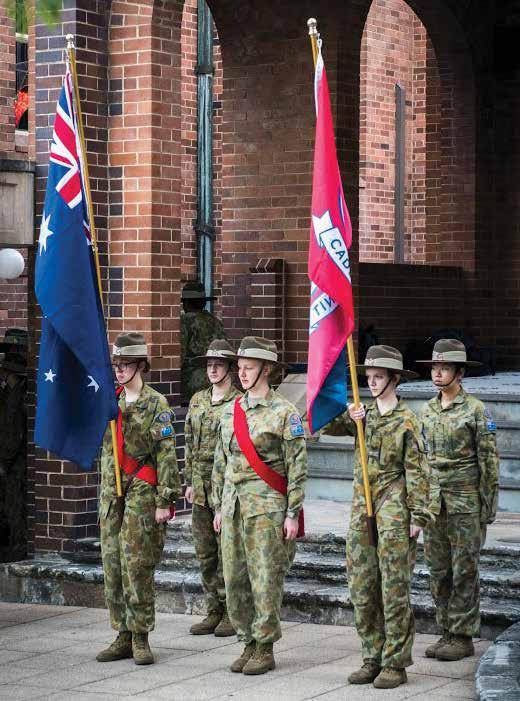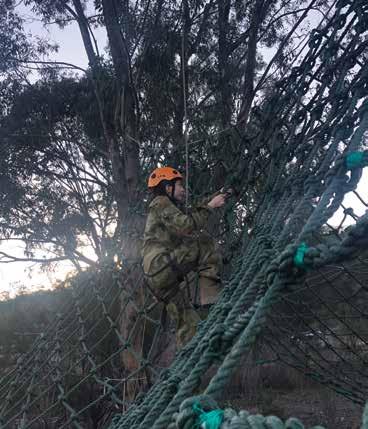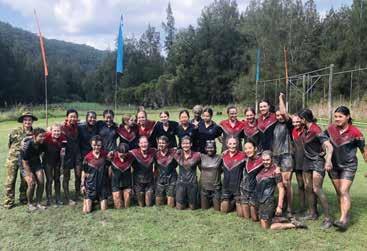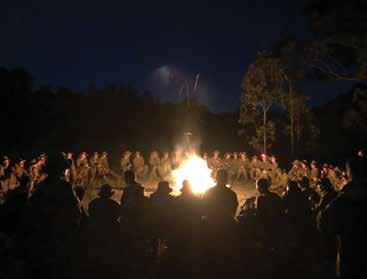
14 minute read
Girls in green: Army Cadet Unit at Pymble
By Stuart Clark, Director of Experiential Learning and Officer Commanding of the Pymble Ladies’ College Army Cadet Unit
Pymble Cadets celebrate challenge and achievement – key themes of the Cadets program
Cadets was a place in which my selfconfidence and personal conviction was allowed to flourish as I was encouraged to trust my instincts and give everything my best try. I found weaknesses to overcome and strengths I didn’t even know I had.”
Pymble Cadet, Year 12 (2019)
Though anecdotal student reflections may not be viewed as rigorous scientific analysis, one would find it hard to debate the authenticity of the evidential thread collected in a recent student survey relating to the outcomes of the Pymble Ladies’ College Army Cadet program. The quote (left), from a recent Year 12 graduate, is reflective of the collective Cadet participant voice. This article will discuss the key areas for personal growth and capacity-building achieved through the program. In April 2017, the Pymble Ladies’ College Army Cadet Unit was formally ratified by the Australian Army Cadets. At that time, the unit was the first all-female Australian Army Cadet Unit in Australia. Though this marks an impressive and progressive step for the College, it is certainly not the reason we embarked on this unique cocurricular journey. The Australian Army Cadets program simply has too many benefits for Pymble girls to leave unexplored and, three years in, the benefits are proven. Australian Army Cadets, which is part of the Australian Defence Force Cadets program, provides a personal development program for young Australians, designed to benefit the nation by helping to create responsible, mature and self-confident young people and future leaders. This is achieved by providing progressive Cadet training, often of a challenging and exciting
nature, to foster confidence, self-reliance, initiative, loyalty and a sense of service, and by encouraging the development of practical leadership and the ability to work successfully as a member of a team. At the ground level, this ideally manifests for participants as fun and friendship, action and adventure, excitement and engaging learning. Cadet lessons range from the history and customs of the Australian Army: positions of rank, dress and bearing; Army drill; Army values; field craft skills, which allow Cadets to live in the bush, such as tying knots, erecting shelters and preparing and consuming rations; first aid; survival; risk assessment; navigation by map and compass and mock soldiering skills such as patrolling, camouflage and concealment. The lessons are tiered in relation to the experience of the learners, using an established curriculum continuum. Many of the above skills are put to the test on Cadet field exercises. A field exercise is a multi-day camp that is planned and executed by Senior Cadets, with staff oversight. Activities on field exercises include bushwalking and navigating in tracked and untracked terrain in daytime and nighttime, sleeping in tents and personal shelters, overnight guard duty on a rotating roster, team challenge activities, obstacle courses, kayaking, abseiling, rock climbing and ropes courses. In cases when the Cadet unit is able to conduct an exercise on a military base, the activities can also involve as activities like firing Army weapons, participating in Army obstacle courses and eating in the soldiers’ mess. This wide range of activities allows students to experience Army culture as well as skill building, which is important because in many ways the structure of the Cadet unit and responsibilities of Cadets to follow, lead, care for their peers and to take risks emulate real life. Some quotes which reflect that intent follow:
“My favourite part of the Cadets program was by far being given the chance to lead and teach cadets, watching as they developed and overcame their own challenges. I watched as my recruits overcame fears of heights through abseiling, and gave public speaking a crack. I observed the growth of the quiet, shy personalities into some of the best leaders I have ever met. And I don’t believe I have ever felt prouder in my life than when I watched members of my recruit platoon be promoted to positions of leadership in the unit. “The most significant and meaningful areas of personal growth involve communication skills as well as confidence. Cadets has allowed me to step outside my comfort zone, to learn and experience new skills and provide opportunities for selfgrowth. This program, unlike others, has provided me a safe but unique space to be open to try new things and improve on myself as a person but also a member of society”.
“My most significant area of personal growth was definitely confidence. I have become much more confident in presenting and speaking to large audiences, which is extremely helpful in situations both within and outside of Cadets. It has helped me while I am teaching lessons to the recruits, debating, giving speeches and has really increased my self-confidence. The most meaningful areas of growth would probably be making new friendships and learning and refining my leadership skills, as I would not have been able to develop these skills in this way elsewhere”.

Pymble Ladies’ College Army Cadet Unit Flag Party preparing for the Anzac Day service
The PLCCU – one big, happy family – at the end of another successful field training exercise

LEARNING FROM THE DATA
A survey was distributed electronically to 40 Cadets ranging from Years 9 to 12 in the middle of 2019. It was a voluntary survey, and three quarters of the cohort completed the process. Responses were composed of 38 per cent of replies from Year 9, 17 per cent from Year 10, 17 per cent from Year 11 and the remaining 28 per cent from Year 12. The survey was timed to coincide with the Year 12 Cadets leaving the unit to commence the HSC, and younger year groups transitioning to new positions within the unit. All questions in this survey, except one, were open-ended with text fields allowing the students to be expansive with their reflections. Responses ranged from one word to more than 150 words. The openended question asked students to rate five key metrics on a sliding scale of ‘high level of growth’, ‘moderate level of growth’, ‘low level of growth’ and ‘no growth’. These metrics were used as they are principles of participation in this program, and it is hoped that all of these metrics will have been enhanced by students’ involvement in the program. The results show some encouraging acknowledgements of the intended outcomes of the program and reinforce the anecdotal responses. A ‘high level of growth’ was indicated for Friendships, rated by 76 per cent of respondents, Leadership by 69 per cent of respondents and Confidence by 62 per cent of respondents. The vast majority of the remaining responses fell in the second-tier of ‘moderate level of growth’. Importantly, of all the respondents, not a single Cadet identified ‘no growth’ in the areas of leadership and confidence, which affirms the relevance and importance of these intents while also providing room for improvement. The Cadet training program sees new recruits undertaking a oneyear structured induction program, followed by completion of a series of modules covering the skills and knowledge needed to be an Army Cadet. Senior Cadets have the opportunity of specialising in either a core function such as ‘Cadet medic’, or a position of leadership which involves mentoring and developing other Cadets. This sees Senior Cadets taking a personalised journey through the later years in the program. Hence, the survey results reflect feedback from a multilayered Cadet training program. The following qualitative comments indicate that Cadet camps are a very impactful and valuable part of the program.
“My favourite part of the Cadets program is being able to go out on camp and use the skills we have learnt in the classroom. I am confident in saying that I experienced growth on these camps that isn’t possible in any other way. Teamwork, leadership and decision making just to name a few, are the skills I have greatly developed by participating in the Cadets program”.
“Along with the people the camps have been an incredible part of the program. They really test people’s character, build stronger connections and allow people to better understand themselves, who they want to become and the relationships they want to keep”.
“Opportunities to lead, build skills, create amazing friendships, step out of your comfort zone and face challenges. Each of these opportunities is unique to the Cadets program. For example; leading large teams of cadets, designing and executing obstacle courses, navigating for hours throughout the night, firing rifles and conducting medical scenarios”.
“The most interesting thing I have learnt was about myself and how I was able to cope with physically and mentally challenging obstacles. For example, the Annual Field Exercise was a great opportunity for me to adapt to different situations and environments so that the outcome could be achieved. Through this, I learned that I was able to be flexible with existing knowledge in order to deliver an enjoyable and informative exercise, lesson or activity”.
THE CADET JOURNEY
Cadets who complete the recruit training program graduate to the rank of Cadet at the end of their first year and are then eligible to apply for the rank of Cadet Corporal. Many choose to pursue the leadership pathway. A Cadet Corporal is in charge of a section of Cadets numbering around eight students. The Cadet Corporal’s role is very important, as it is the first line of pastoral care and mentoring for Cadets, which is vital to establish a healthy culture. This is a key element given the potential physical and emotional stresses applied during parts of the program. Other positions of Cadet rank in an Australian Army Cadet Unit include Cadet Sergeant, who is the second in charge of a platoon of Cadets, which usually numbers around 25 Cadets. The Cadet Sergeant has primary responsibility for discipline and administration for her platoon. The Cadet Under Officer is a platoon commander in charge of overall safety and management of all cadets in her care. Cadet Warrant Officers are posted to a variety of logistical and command roles including Quartermaster and Company Sergeant Major. The Senior Under Officer is the Head Cadet and is in charge of the overall safety and management of all members within the unit and planning and execution of exercises and activities.
Positions of rank within the unit are in tight competition. Cadets self-nominate to be considered for rank and have a number of eligibility requirements to meet. Once accepted onto the rank assessment course, candidates must complete a number of tasks including self-directed assignments, a theory examination, preparing and delivering lessons or activities and displaying their ability to apply command and control in an effective manner in differing contexts. Cadet rank courses are challenging and regardless of whether a cadet successfully achieves the rank for which she is striving, the courses will teach the girls many valuable lessons. Cadets who take on a rank have a specific, defined leadership role within the Cadet unit, and find the experience of leading both challenging and exhilarating. A number of Cadets have shared their personal hardships in leading a team of peers, noting the very same issues that adults experience in their own leadership journeys, such as building trust, dealing with conflict and overcoming the fear of failure and embarrassment. Comments within the survey reflect this clearly, including:
“My greatest challenge was trying to improve my leadership. This is because I am a very shy and quiet person, and I still am. But the Cadets program helped me become more articulate and expressive when I needed to deliver a message across. It wasn’t an easy task, but Cadets gave me a chance to push myself out of my comfort circle as see the infinite ways I would improve my ability to communicate with others and show leadership”.

Teamwork makes the dream work – and a rainbow always helps too!
“Everything has pushed me, but leadership has been my greatest challenge and the hardest thing to overcome. I have learnt to step up, I learnt a way to lead that made everyone feel included and listened to, while still making decisions and ensuring everyone follows through with them. I believe it is such an important thing to discover how you lead because it says a lot about yourself, and for me was a really big challenge”.
EMOTIONAL AND PHYSICAL CHALLENGE
Even though most Cadets will describe the program as ‘fun’ and ‘interesting’ in general, there are parts of the program which certainly take students beyond their comfort zones and apply pressure with the intention of building coping mechanisms and realising inner strength. In particular, the physical challenges on camps such as 24-hour navigation exercises,

“Being a platoon commander has many challenges, including the mentoring of your Sergeant and Corporals for the duration and beyond the training cycle. Your decisions can affect all members of the platoon and you have to keep this in mind at all times when preparing activities and arrangements for them. The whole time, you are making
sure that you are Climbing a cargo net: just one of the exciting elements of the appealing to their Cadet experience
interests to make it an enjoyable
experience but also making leadership dynamics and studentsure that your decisions keep to-student activity facilitation are them safe”. key stressors, and ones very unique in school co-curricular programs and student leadership contexts. The Cadets program deliberately applies experiential learning theory and practice to elicit learner outcomes. The life lessons and personal attribute growth gained from these controlled stress situations are significant. School leavers need, among other traits, a decent amount of resilience, selfconfidence and awareness of self, and it is proven that experiential learning through outdoor education can contribute hugely to the acquisition of these characteristics. It is always interesting to observe the responses of groups of people placed in a state of stress in unfamiliar and challenging environments. There is invariably a Forming, Storming, Norming, Performing process (Tuckman, 1965) which takes the group through varying stages of group cohesion. In the Cadet program, this is notable during field exercises when Cadets are naturally tired, hungry and emotional –and as a result tempers can be short. Cadets on exercise are challenged to negotiate the unpredictable nature of group dynamics, coming to an understanding that teamwork and communication are key to task completion and, ultimately, to solidarity. In the survey, many Cadets also referenced the personal challenges the program applies and subsequent personal learnings, with some key examples as follows:
Mud run is a favourite activity among our Cadets

“One of the greatest challenges I have had to experience in my Cadets experience was having to stay persistent and strong on camp even if I was tired. I learnt that if one team member is down, the team morale will be brought down, so I always try my hardest to keep the team spirit up while also keeping my body spirit up”.
“Participating in the camps at different levels of rank has been an eye-opening experience to look back on. I am confident in saying that I experienced growth on these camps that isn’t possible in any other way. Teamwork, leadership and decision making just to name a few, are the skills I have greatly developed by participating in the Cadets program and I don’t know where I would be if I hadn’t taken the step and signed up in those first weeks”.
Evening campfire is a time to reflect on the day and bonding with friends CONCLUDING THOUGHTS

As Pymble Co-Curricular programs are voluntary, it is always a risk that a new program, and particularly a niche program, will not flourish due to the multitude of options on offer and the complexities of Pymble students’ schedules. Three years on, with Cadet numbers currently at 65 students across the eligible year groups of Years 8 to 12, the program has gained its own life force and culture, and continues to create inspiring results for the students who commit to it wholly.
Initiative and skills in action – it is literally sink or swim!

Like all programs and subjects at the College, Army Cadets requires attention to detail to ensure continuous improvement and quality control – luckily in the case of Pymble Army Cadets, and once again displaying the uniqueness of this program, the greatest enabler to ensuring this happens are the Cadets themselves.
References Tuckman, B.W., (1965). Developmental sequence in small groups. Psychological Bulletin, Issue 6, p. 384–399.










